I understand you're not allowed to create two mutable references to an object at once in Rust. I don't entirely understand why the following code works:
fn main() {
let mut string = String::from("test");
let mutable_reference: &mut String = &mut string;
mutable_reference.push_str(" test");
// as I understand it, this creates a new mutable reference (2nd?)
test(&mut *mutable_reference);
println!("{}", mutable_reference);
}
fn test(s: &mut String) {
s.push_str(" test");
}
